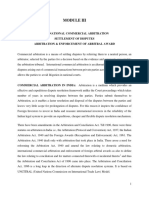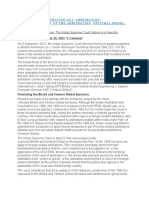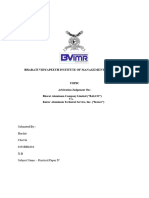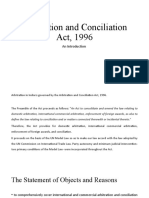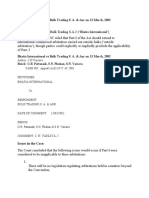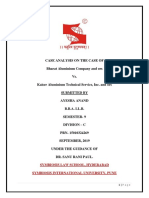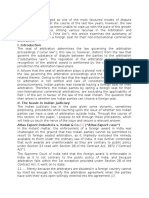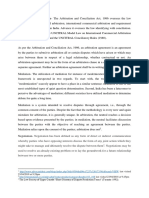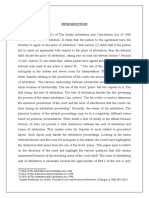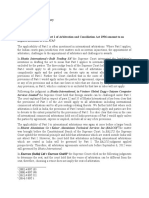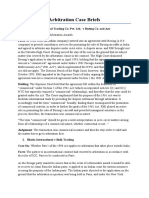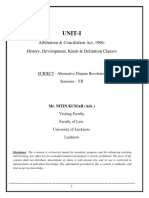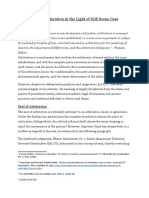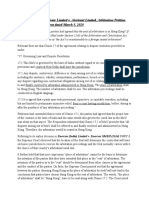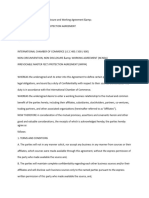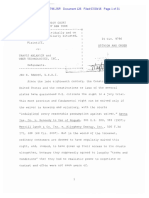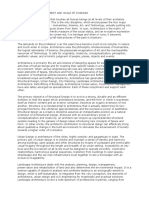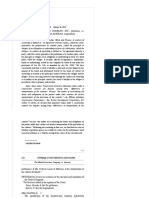0 ratings0% found this document useful (0 votes)
53 viewsMuqeet 2
Muqeet 2
Uploaded by
Matthew Rothcopyright and entertainment industry in india.
It talks about How the entertainment industry is protected by copyright law..
Sec/14 of the Act defines the word copyright..
Copyright:
© All Rights Reserved
Available Formats
Download as DOCX, PDF, TXT or read online from Scribd
Muqeet 2
Muqeet 2
Uploaded by
Matthew Roth0 ratings0% found this document useful (0 votes)
53 views7 pagescopyright and entertainment industry in india.
It talks about How the entertainment industry is protected by copyright law..
Sec/14 of the Act defines the word copyright..
Copyright
© © All Rights Reserved
Available Formats
DOCX, PDF, TXT or read online from Scribd
Share this document
Did you find this document useful?
Is this content inappropriate?
copyright and entertainment industry in india.
It talks about How the entertainment industry is protected by copyright law..
Sec/14 of the Act defines the word copyright..
Copyright:
© All Rights Reserved
Available Formats
Download as DOCX, PDF, TXT or read online from Scribd
Download as docx, pdf, or txt
0 ratings0% found this document useful (0 votes)
53 views7 pagesMuqeet 2
Muqeet 2
Uploaded by
Matthew Rothcopyright and entertainment industry in india.
It talks about How the entertainment industry is protected by copyright law..
Sec/14 of the Act defines the word copyright..
Copyright:
© All Rights Reserved
Available Formats
Download as DOCX, PDF, TXT or read online from Scribd
Download as docx, pdf, or txt
You are on page 1of 7
BHATIA INTERNATIONAL TO BALCO: PARADIGM SHIFT IN
ARBITRATION LAW IN INDIA.
INTRODUCTION
Arbitration is a medium which provides an effective and expeditious dispute resolution
framework unlike the Court proceedings which takes number of years in resolving disputes
between the parties. Parties submit themselves to Arbitration, as it enables a faster resolution and
disposal of the disputes between the parties and leaves very little scope for prolongation of
disputes. For this reason it inspires the confidence of Foreign Investors to invest in India and
reassure international investors in the reliability of the Indian legal system to provide an
expeditious, cheaper and flexible dispute resolution mechanism.
There have been amendments in the Arbitration and Conciliation Act. Till 1996, there were three
statutes on arbitration in India i.e., the Arbitration (Protocol and Convention) Act, 1937, the
Indian Arbitration Act, 1940 and the Foreign Awards (Recognition and Enforcement) Act, 1961.
The Arbitration Act, 1940 dealt only with arbitration that took place in India. There arose a need
for reforming the Arbitration Act, 1940 and amend the law relating to domestic arbitration,
international commercial arbitration and enforcement of foreign arbitral awards as also to define
the law relating to conciliation and for matters connected therewith or incidental thereto
1
and
thus the Arbitration and Conciliation Act of 1996 came into place. The Arbitration and
Conciliation Act, 1996 is a long leap in the direction of alternate dispute resolution systems. It is
based on UNCITRAL (United Nations Commission on International Trade Law) Model.
2
The Arbitration and Conciliation Act of 1996 has divided itself into two parts. The First part
deals with Arbitration that is conducted in India and its enforcement. The Second part provides
for arbitration conducted in a Foreign Country and enforcement of such foreign awards.
The resolution of disputes through Arbitration is the most expeditious, cheap and flexible means
of dispute resolution. Parties prefer this Statute for the resolution of their disputes for the reason
that they can decide as to whether to refer their dispute to a specific arbitrator or a panel of
arbitrators with a developed expertise in the subject matter in dispute, control on the timetable as
opposed to leaving this to the court administrators, confidentiality etc.
1
Preamble, The Arbitration and Conciliation Act, 1996
2
Ibid
Arbitration with Indian companies has been a challenge for the other (foreign) parties. Over the
years it became increasingly complex for the parties to invoke contractual dispute-resolution
clause. Enforcing foreign tribunal awards faced a unique difficulty in India. Some of the hurdles
had been resolved by the Supreme Court in BALCO case.
3
The apex court of the country, on
September the 6
th
2012 gave most awaited (landmark) judgment in BALCO case, overruling its
decisions in previous cases. This decision of the court gave the countrys standing as a
jurisdiction hospitable to international commercial arbitration a major boost.
The key issue in BALCO case involved the question about the role f Indian Courts in arbitrations
where the contracting parties have chosen the seat to be outside of India. The court took
cognizance of the matter and gave a 190 page Judgment. Supreme Court after hearing both the
parties held that Indian Courts does not have Jurisdiction to set aside awards or issue interim
orders to arbitration seated abroad. Supreme Court in its Judgment also made it clear that Part I
of the Arbitration and Conciliation Act, 1996 act does not apply to the international commercial
Arbitration seated outside India or in the words of the Honble Justice Surinder Singh Nijjar,
awards rendered by international tribunals seated outside of India, would only be subject to the
jurisdiction of the Indian courts when the same are sought to be enforced in India in accordance
with the provisions contained in Part II of the Arbitration Act, 1996., overruling its Judgment in
Bhatia case where it held that any arbitration having its 'seat' outside India is also subject to Part
I of the Act unless the parties had by express or implied agreement excluded it.
The Balco judgment has been widely appreciated for the clarity it has brought in the often
contested position on the applicability of Part I of the 1996 Act to foreign arbitrations and is a
welcome relief for parties to international commercial arbitrations who would fear undue
intervention of Indian courts. However, the Judgment was given prospecting affect that is to say
it will be applicable only to the agreements which have been entered after 6th September 2012.
Thus the judgment would not be applicable to a dispute which arose after the date of Judgment
provided that agreement took place before the date of Judgment. Thus the arbitration disputes
would still be governed by BHATIA Judgment for a foreseeable future.
With this decision, the law governing arbitrations in India has regained its lost direction.
However, the journey has only partially been covered, as efforts are required from the both the
3
Bharat Aluminum Co. v. Kaiser Aluminum Technical Services Inc., AIR 2005 Chh 21, 2006 (1) MPHT 18 CG.
judiciary, in so far as it remains consistent with its findings and approach even in respect of
pending and remanded cases, and the legislature, in so far as it provides suitable and timely
support to the arbitral process through amendments to the 1996 Act.
LAW PRIOR TO BALCO V KAISER
The Supreme Court in Bhatia International v. Bulk Trading S.A,
4
held that Part-I of the
Arbitration & Conciliation Act would apply only to international commercial arbitration held
outside India but parties could expressly or impliedly exclude the applicability of Part-I. The
Court reasoned that were Part-I to be held inapplicable to such arbitrations, the following
anomalies would arise:
1. There would be no law governing arbitrations held in non-convention countries.
2. Part-I would apply to Jammu & Kashmir in all international commercial arbitrations
(including outside arbitrations) but for the rest of India, Part-I would not apply to outside
arbitrations.
3. Ss. 2(4) and (5)
5
would be in conflict with S. 2(2) of the Act.
6
4. A party to an outside arbitration would have no remedy to obtain interim relief even if the
assets which are the subject matter of such application for interim relief are in India.
The above reasoning in Bhatia International has been widely criticized by jurists as being
grossly erroneous. One of the main justifications given by the Apex court in Bhatia International
was that Part-I did not give an option to parties of utilizing interim measures in arbitrations held
outside the territory of India. Before Bhatia International, various High Courts had given
different and often conflicting judgments relating to power of a court to order interim measures
of protection in arbitrations held outside of India, i.e., outside arbitration.
4
AIR 2002 SC 1432.
5
(4) This Part except sub-section (1) of section 40, sections 41 and 43 shall apply to every arbitration under any
other enactment for the time being in force, as if the arbitration were pursuant to an arbitration agreement and as if
that other enactment were an arbitration agreement, except in so far as the provision of this Part are inconsistent with
that other enactment or with any rules made thereunder;
(5) Subject to the provisions of sub-section (4), and save in so far as is otherwise provided by any law for the time
being in force or in any agreement in force between India and any other country or countries, this Part shall apply to
all arbitrations and to all proceedings relating thereto.
6
Sec/2(2) of The Arbitration and Conciliation Act,1996, This Part shall apply where the place of arbitration is in
India.
THE BALCO JUDGMENT
The broad thrust of the BALCO decision is to protect the future from the erroneous and
Anachronistic decisions of the past and, consistent with underlying philosophy and ethos of the
New York Convention and UNCITRAL Model law, exhort Indian courts to become more
Arbitration-friendly and thereby less prone to intervene in the arbitral process. To this end,
BALCO certainly lives up to the buzz and hype created in the international arbitration
community after news broke out earlier this year that the Indian Supreme Court was hearing a
case that sought a reconsideration of its earlier decisions in Bhatia International and Venture
Global Engineering.
The decision in Bharat Aluminium Co. v Kaiser Aluminium Technical Services overrules
previous controversial decisions from the Indian Supreme Court in the cases of Bhatia
International v Bulk Trading S.A.in 2002 and Venture Global Engineering v Satyam Computer
Services Limited in 2008. As discussed earlier, we know that in those cases, the Court held that,
unless the parties to an arbitration agreement expressly or impliedly agreed to the contrary, the
Indian courts had similar jurisdiction in foreign-seated arbitrations as they had in domestic
arbitrations seated in India, under Part I of the Arbitration and Conciliation Act 1996.
As a result of these earlier decisions, Indian courts, in a number of instances, have granted
interim measures in respect of foreign-seated arbitrations. In the case of Venture Global, the
Supreme Court was prepared to set aside an award made in a foreign seated arbitration, in
contradiction to the underlying philosophy and objectives of the New York Convention on the
enforcement and foreign arbitral awards and the UNCITRAL Model Law.
Here in the BALCO case the parties in their agreement specified that any dispute under the
Agreement would be settled in accordance with the English Arbitration Law, and the seat of
arbitration was specified to be at London. The Agreement further stated that the governing law
with respect to the Agreement was Indian law; however, arbitration proceedings were to be
governed and conducted in accordance with English Law. Disputes arose and were duly referred
to arbitration in England. The arbitral tribunal passed two awards in England which were sought
to be challenged in India u/s. 34 of the Act in the district court at Bilaspur. Successive orders of
the district court and the High Court of Chhattisgarh rejected the appeals. Therefore, BALCO
appealed to the Supreme Court.
The main issues decided by the apex court in the instant case were as follows:
I. The Word Only
Conspicuously section 2(2) of the Indian Act, which states that This Part [Part I] shall apply
where the place of arbitration is in India, did not include the world only akin to Article 1(2) of
the Model Law. The Court in Bhatia found this to be an opt-out provision wherein Part I applied
to all arbitrations unless it was expressly or implicitly excluded. The court in Bharat Aluminum
held that this was not a case of cassus omissus and the territoriality principle of arbitration still
applied. Overruling Bhatia the Court held that the word only in the Model Law was meant to
limit extra-territoriality to Arts. 8, 9, 35 & 36. Since the Indian Act did not make scope for such
extra territoriality, it was deemed redundant to include it in the legislation. Having over-ruled
Bhatia the Court finds that Part I and Part II are two independent pieces of legislation and there is
complete segregation between the two.
II. Setting Aside Foreign Awards.
Considering Bhatia stands overruled, Venture Global is left with no legal basis. The Court has
come to the obvious conclusion that an Indian Court cannot set aside a foreign award. It was
argued that the New York Convention provides for a second forum for annulment. The Court
concluded that this second alternative refers to the procedural law of arbitration rather than the
law governing the substantive portion of the contract. This second forum would be available
only in the event that the first alternative failed (i.e., competent authority of the country in which
the award was made).
III. Interim Relief.
The decision in Bharat Aluminum finally restores the territoriality principle of the Model Law. It
Recognizes that the forum where the arbitration is seated shall have sole jurisdiction over the
arbitration. This raises an interesting problem. Since Section 2(2) of the Indian Arbitration Act,
1996 does not carve out exceptions similar to Art. 1(2) of the Model Law, parties that have their
seat of arbitration outside India may not be able to get interim relief from Indian Courts. Hence
Section 9 injunctions (akin to Art. 9 of the Model Law) will be unavailable to parties seeking to
enforce the arbitral tribunals interim relief orders. It is interesting to note the dicta of the Court
that applying Section/ 9 in foreign arbitrations would be destructive of the territorial principles
upon which the UNCITRAL Model Laws are premised.
The bench observed that in a foreign seated international commercial arbitration, no application
for interim relief would be maintainable under Section 9 or any other provision, as applicability
of Part I of the Arbitration Act, 1996, is limited to all arbitrations which take place in India.
Similarly, no suit for interim injunction would be maintainable in India, on the basis of an
international commercial arbitration with a seat outside India. Part I of the Arbitration Act,
1996, is applicable only to all the arbitrations which take place within the territory of India.
Parties to foreign arbitrations can only avail of enforcement remedies in Part II of the Act, which
contains provisions similar to the New York Convention.
CONCLUSION
Indian Supreme Court has embarked on a direct inquiry as to the intention and purpose behind
the relevant provisions of the UNCITRAL Model Law and the New York Convention, as
discernible from the travaux prparatoires, in addition to appreciating how those operative
provisions are understood in several other jurisdictions. This is an important development
because it represents a paradigm shift away from its previous case-law and practice. The apex
courts willingness to do so, in fact, resoundingly conveys the message that Indian courts will no
longer hesitate to be directly guided by the terms of the relevant international conventions, as
they are understood internationally, and, if the need arises, construe Indian legislation in
conformity with the same. This is all the more significant in view of the fact that, even now, one
of the major hurdles that arbitration users face in India is the Indian courts difficulty in being
able to adapt and transition to arbitrations governed by a law based on the UNCITRAL Model
Law, despite it being enacted in 1996. As explained above, the Bhatia or Venture Global
decisions enabled Indian courts to assert jurisdiction with respect to foreign-seated arbitrations
involving an Indian party, unless the parties had expressly or impliedly agreed to the contrary.
Seen in that light, it is important to note that these decisions did not affect the validity of foreign-
seated arbitration clauses involving an Indian party. With respect, it is thus anon-sequitur to
argue that by overruling these decisions, such foreign-seated arbitration clauses would be
somehow susceptible to being invalidated as well. On the contrary, the only past transactions that
were susceptible to being invalidated in the wake of the BALCO decision were court
proceedings (either pending or those having attained finality) commenced in India on the basis of
the Bhatia or Venture Global decisions. Accordingly, the BALCO decision should have been
applied prospectively to the commencement of any proceedings in India rather than the
execution of any new arbitration agreements. This is, in fact, likely to become a contentious issue
in the future. Given the significant delays in court proceedings in India and the fact that it is not
uncommon to obtain a final decision only after litigating there for at least 7 to 10 years, the
BALCO decision effectively means that despite Bhatia and Venture Global being expressly
overruled, those precedents will ironically continue to guide the Indian courts for another decade
or so with respect to arbitration agreements entered into prior to 6 September 2012. Unless the
Indian Supreme Court subsequently backpedals on this issue, to the extent I discussed above,
there is likely to be a lot of confusion created in any attempt made by the Indian courts to
maintain two parallel regimes for the next decade or so.
You might also like
- ADR - Case Briefs - ADR - Amit JyotiDocument72 pagesADR - Case Briefs - ADR - Amit JyotiArchitUniyalNo ratings yet
- Simple Guide for Drafting of Civil Suits in IndiaFrom EverandSimple Guide for Drafting of Civil Suits in IndiaRating: 4.5 out of 5 stars4.5/5 (4)
- Contract Manufacturing AgreementDocument12 pagesContract Manufacturing Agreementruah 1984100% (1)
- ITL Module 3Document27 pagesITL Module 3joy parimalaNo ratings yet
- BALCO Vs Kaiser - FinalDocument12 pagesBALCO Vs Kaiser - FinalHarneet SachdevaNo ratings yet
- Balco Case Comments-Ashish ChughDocument6 pagesBalco Case Comments-Ashish ChughNipun GuptaNo ratings yet
- AdrDocument8 pagesAdrRupali RamtekeNo ratings yet
- BALCO Vs KaiserDocument13 pagesBALCO Vs KaiserHarneet Sachdeva0% (1)
- Bharat Aluminium Co LTD V Kaiser Aluminium Technical IncDocument9 pagesBharat Aluminium Co LTD V Kaiser Aluminium Technical Incabhishek5641100% (1)
- Harshit PPDocument4 pagesHarshit PPVishu DhallNo ratings yet
- Enforcement of Foreign AwardsDocument6 pagesEnforcement of Foreign AwardsMAHANTESH GNo ratings yet
- Case BriefsDocument11 pagesCase BriefsAhkam KhanNo ratings yet
- Bharat Aluminium Company-COMMENTSDocument3 pagesBharat Aluminium Company-COMMENTSNipun GuptaNo ratings yet
- ARBIDocument8 pagesARBIstatutesimplifiedNo ratings yet
- International Commercial Arbitration: TDM Infrastructure Pvt. Ltd. v. UE Development India Pvt. LTDDocument4 pagesInternational Commercial Arbitration: TDM Infrastructure Pvt. Ltd. v. UE Development India Pvt. LTDdynamo vjNo ratings yet
- The Renewal of Arbitration in India:: BALCO - V-Kaiser AluminiumDocument2 pagesThe Renewal of Arbitration in India:: BALCO - V-Kaiser AluminiumSambit DashNo ratings yet
- Arbitration and Conciliation Act, 1996: An IntroductionDocument25 pagesArbitration and Conciliation Act, 1996: An IntroductionupendraNo ratings yet
- Module-II: Arbitration Governed Under Part-IDocument81 pagesModule-II: Arbitration Governed Under Part-IAyush BakshiNo ratings yet
- Int Comm Arbitration Document PDFDocument103 pagesInt Comm Arbitration Document PDFHemantPrajapatiNo ratings yet
- Bhatia International Vs Bulk Trading SDocument5 pagesBhatia International Vs Bulk Trading SP KarthickrajaNo ratings yet
- JOIA2009020Document16 pagesJOIA2009020Ikram Ullah LecturerNo ratings yet
- 4 IracDocument6 pages4 IracShrika GautamNo ratings yet
- Indian Judiciary On Foreign Seated ArbitrationDocument4 pagesIndian Judiciary On Foreign Seated ArbitrationAnshul AgarwalNo ratings yet
- Landmark Judgements ArbitrationDocument8 pagesLandmark Judgements ArbitrationShreesha Bhat KailankajeNo ratings yet
- 11 Chapter 5Document58 pages11 Chapter 5Ranadeep PoddarNo ratings yet
- Ayesha Anand IRACDocument19 pagesAyesha Anand IRACAyesha AnanadNo ratings yet
- Brief Notes On Cases of AdrDocument5 pagesBrief Notes On Cases of AdrTRILOK CHANDNo ratings yet
- Balco Case NlsiuDocument7 pagesBalco Case NlsiuBhoomika GandhiNo ratings yet
- Topic 2 - Applicability of Part I, Section 2Document11 pagesTopic 2 - Applicability of Part I, Section 2ArchitUniyalNo ratings yet
- ADR IntroDocument6 pagesADR Introshilpasingh1297No ratings yet
- International Commercial Arbitration Notes & AnswersDocument9 pagesInternational Commercial Arbitration Notes & AnswersSme 2023No ratings yet
- Seat Vs VenueDocument7 pagesSeat Vs Venuekartik aryNo ratings yet
- Badrinath Srinivasan PDFDocument30 pagesBadrinath Srinivasan PDFshreyashkarNo ratings yet
- ADR Unit-1 Reading MaterialDocument19 pagesADR Unit-1 Reading MaterialEarl JonesNo ratings yet
- Arbitration Open BookDocument13 pagesArbitration Open BookMithun MenonNo ratings yet
- De Jure Seat of ArbitrationDocument7 pagesDe Jure Seat of ArbitrationKanishk JoshiNo ratings yet
- Sushovan Choudhury, 16010224009, Group A, AM 47 - 48Document2 pagesSushovan Choudhury, 16010224009, Group A, AM 47 - 48Sushovan ChoudhuryNo ratings yet
- India and Its Recent Developments in International Commercial ArbitrationDocument13 pagesIndia and Its Recent Developments in International Commercial Arbitrationtayyaba redaNo ratings yet
- BalcoDocument12 pagesBalcosanskarNo ratings yet
- Blog Ipleaders in Arbitration and Conciliation Act 1996Document12 pagesBlog Ipleaders in Arbitration and Conciliation Act 1996Pandit TiwariNo ratings yet
- Arbitration Case BriefsDocument39 pagesArbitration Case BriefsRithvik MathurNo ratings yet
- Unit-I: Arbitration & Conciliation Act, 1996: History, Development, Kinds & Definition ClausesDocument8 pagesUnit-I: Arbitration & Conciliation Act, 1996: History, Development, Kinds & Definition Clausesmansimran.maviNo ratings yet
- Commercial Arbitration in India and Recent Developments: International Journal of LawDocument2 pagesCommercial Arbitration in India and Recent Developments: International Journal of LawMAHANTESH GNo ratings yet
- United Nations States Arbitrate International Arbitration ConventionsDocument6 pagesUnited Nations States Arbitrate International Arbitration Conventionszoha aslamNo ratings yet
- Arbitration in IndiaDocument17 pagesArbitration in IndiaanshumangaurNo ratings yet
- Bharat Aluminium Co. Vs Kaiser Aluminium Technical ServicesDocument9 pagesBharat Aluminium Co. Vs Kaiser Aluminium Technical ServicesIsraa ZaidiNo ratings yet
- Balco and BhatiaDocument3 pagesBalco and BhatiaupanshushettyNo ratings yet
- Adr Case2 JudgedmentDocument2 pagesAdr Case2 JudgedmentAryan DasNo ratings yet
- 2818 2021 33 1501 27661 Judgement 20-Apr-2021Document106 pages2818 2021 33 1501 27661 Judgement 20-Apr-2021Richa KesarwaniNo ratings yet
- Domestic ArbitrationDocument17 pagesDomestic ArbitrationArnold StanleyNo ratings yet
- 14 - Chapter 4 PDFDocument72 pages14 - Chapter 4 PDFMAHANTESH GNo ratings yet
- Applicability of Part I To Int'l Commercial Arbitration - Prolegmenon To Deciding The Issue in Bharat AluminiumDocument23 pagesApplicability of Part I To Int'l Commercial Arbitration - Prolegmenon To Deciding The Issue in Bharat AluminiumNishant SharmaNo ratings yet
- Significant Judgments On Arbitration and Conciliation Act, 1996 - May, 2020 To July, 2020 - Litigation, Mediation & Arbitration - IndiaDocument11 pagesSignificant Judgments On Arbitration and Conciliation Act, 1996 - May, 2020 To July, 2020 - Litigation, Mediation & Arbitration - IndiavishwaNo ratings yet
- Q N A - ADRDocument37 pagesQ N A - ADRSrinivasa RaoNo ratings yet
- Enforcement of Foreign Arbitral Awards in IndiaDocument7 pagesEnforcement of Foreign Arbitral Awards in Indiaadias009No ratings yet
- Hardy Exploration in The Light of SGS Soma CaseDocument5 pagesHardy Exploration in The Light of SGS Soma CaseBhuvneshwari RathoreNo ratings yet
- Arb - Case LawsDocument19 pagesArb - Case Lawssaurav singhNo ratings yet
- Arbitration Law India Critical AnalysisDocument23 pagesArbitration Law India Critical AnalysisKailash KhaliNo ratings yet
- Alternative Dispute ResolutionDocument21 pagesAlternative Dispute ResolutionSaro AishwaryaNo ratings yet
- PIL Assignmet - Aditya Maheshwari - 1757Document5 pagesPIL Assignmet - Aditya Maheshwari - 1757Aditya MaheshwariNo ratings yet
- Mitshubhishi Motors Corp. V Soler Chrysler PlymouthDocument10 pagesMitshubhishi Motors Corp. V Soler Chrysler PlymouthHimanshuNo ratings yet
- Afp Vs NLRCDocument2 pagesAfp Vs NLRCRyan AnatanNo ratings yet
- Question Bank C To BDocument211 pagesQuestion Bank C To Bsushiljp1984No ratings yet
- Ncnda FormatDocument25 pagesNcnda FormattajudeenNo ratings yet
- MY-care Contract HFR LogisticsDocument8 pagesMY-care Contract HFR LogisticsFayaz IsmailNo ratings yet
- Cable Corp vs. AP MSE Facilitation Council - Telangana HC Page 5Document15 pagesCable Corp vs. AP MSE Facilitation Council - Telangana HC Page 5Pragalbh BhardwajNo ratings yet
- SSP Documentation Fill The Below Required Information: Mr. Avinash PurtyDocument28 pagesSSP Documentation Fill The Below Required Information: Mr. Avinash Purtyavinash purtyNo ratings yet
- Jplus Asia Development Corp., Petitioner, - Versus-Utility Assurance Corporation, Respondent. GR. NO. 199650, JUNE 26, 2013Document21 pagesJplus Asia Development Corp., Petitioner, - Versus-Utility Assurance Corporation, Respondent. GR. NO. 199650, JUNE 26, 2013Cheska Almira J. ArellanoNo ratings yet
- Profile - AVNISH SHUKLA-ADVOCATEDocument10 pagesProfile - AVNISH SHUKLA-ADVOCATEAvnish ShuklaNo ratings yet
- The Rubber Trade Association of Europe: TH STDocument15 pagesThe Rubber Trade Association of Europe: TH STZviagin & CoNo ratings yet
- Dissolution and Winding Up of Partnership Under The Partnership ActDocument9 pagesDissolution and Winding Up of Partnership Under The Partnership ActAnkita BalNo ratings yet
- Retubing TenderDocument47 pagesRetubing TenderHamzaNoumanNo ratings yet
- Introduction To Alternative Dispute ResolutionDocument9 pagesIntroduction To Alternative Dispute ResolutionRanveer ThelifechangerNo ratings yet
- International Commercial Arbitration and PRC Arbitration Course ManualDocument97 pagesInternational Commercial Arbitration and PRC Arbitration Course ManualАндрей СергеевичNo ratings yet
- Meyer V Kalanick - Order Re ArbitrationDocument31 pagesMeyer V Kalanick - Order Re ArbitrationprofcgardenNo ratings yet
- Ajanta Limited and Ors Vs Ajanta Transistor Clock D133019COM510376Document24 pagesAjanta Limited and Ors Vs Ajanta Transistor Clock D133019COM510376AbhineetNo ratings yet
- Ghana Investment Promotion Centre (Gipc) Act 865Document19 pagesGhana Investment Promotion Centre (Gipc) Act 865JeffreyNo ratings yet
- Corpo Cases CompiledDocument310 pagesCorpo Cases Compiled정카밀라No ratings yet
- Television and Production Exponents, Inc. vs. ServañaDocument15 pagesTelevision and Production Exponents, Inc. vs. ServañaKKCDIALNo ratings yet
- Arbi - Unit 01 - LLB3Document16 pagesArbi - Unit 01 - LLB3meenakshi kaurNo ratings yet
- International ArbitrationDocument579 pagesInternational ArbitrationAlex John Harrison100% (3)
- Salient Features of Uncitral Model Law: Presented byDocument15 pagesSalient Features of Uncitral Model Law: Presented byMd. Ibnul Rifat UddinNo ratings yet
- Nacar v. Gallery Frames - G.R. No. 189871, August 13, 2013Document15 pagesNacar v. Gallery Frames - G.R. No. 189871, August 13, 2013Tris LeeNo ratings yet
- Tender TNDocument29 pagesTender TNRaj BorkuteNo ratings yet
- Course Outlines - Sem V - ADR (Clinical)Document11 pagesCourse Outlines - Sem V - ADR (Clinical)SUDHANSHU SINGHNo ratings yet
- Central Pangasinan Elec Coop vs. MacaraegDocument11 pagesCentral Pangasinan Elec Coop vs. MacaraegAira Mae P. LayloNo ratings yet
- Liya Final With Sign PDFDocument36 pagesLiya Final With Sign PDFvarun v sNo ratings yet
- Terms and Conditions For Morgan Stanley Stockplan Connect and Solium ShareworksDocument13 pagesTerms and Conditions For Morgan Stanley Stockplan Connect and Solium ShareworksPat LannyNo ratings yet
- Conditions of Engagement and Scale of ChargesDocument34 pagesConditions of Engagement and Scale of Chargespragya rajputNo ratings yet
- The Manila Insurance Company, vs. AmuraoDocument15 pagesThe Manila Insurance Company, vs. AmuraoAnonymous WDEHEGxDhNo ratings yet



